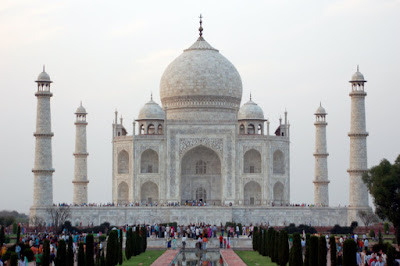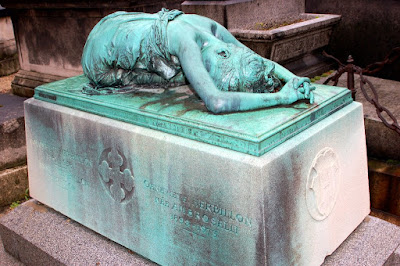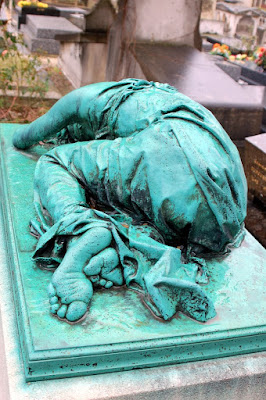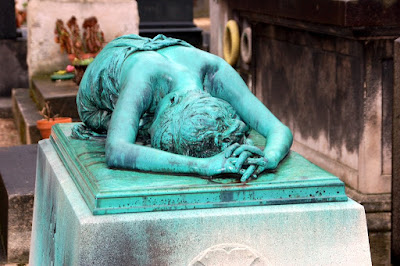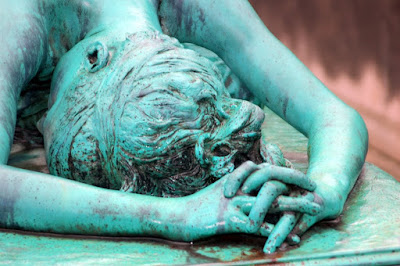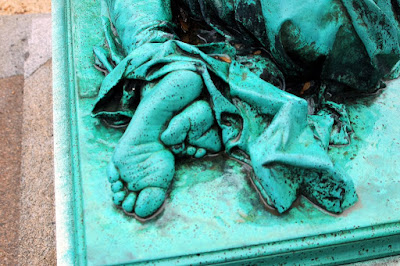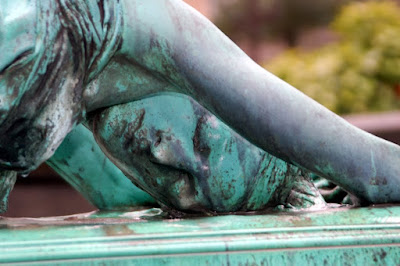The Nature of Service
I've got to put a disclaimer here, as much as I hate them. I am talking purely about my personal opinions here, and about my reaction to these events. It is not at all my intent to impugn or judge any culture, particularly one as old and venerated as that of India. This essay is my own natural reaction to the treatment I received, and let me preamble all of it by saying, I would rather have the experience I describe below visited upon me a thousand times, than to have a hostile culture reject me through isolation, expulsion, or any sort of violence.
If there's any great life lesson I've learned in India, it's that I am no good at being served.
It was impossible for me to imagine the nature of the service I received in India, even though it was explained to me several times. It was explained as a luxury by Americans, and as a fact of life for Indians. For me, it was a nightmare, and a nightmare that was repeated over and over, in every place I visited and every situation in which I found myself.
Housekeeping
At my company's Bangalore office, there were 4 women whose jobs were "housekeeping". In America, this position would mean that you never see them, because they only come in the office at night, to empty garbage and sweep floors. In India, "housekeeping" means keeping the workers (the developers, the software testers) at their desks by doing absolutely everything for them. Housekeeping brings water to the meeting rooms, they straighten out the break room area after people have finished lunch, and they dust the stairs clean several times a day.
The first day I was there, a cold bottle of mineral water materialized on my desk. My coworker asked me if I would like a masala dosa, and I said that I would. He said a few words to someone, and twenty minutes later, I had one. When they weren't actively working, they would sit in the stairwell landings and talk quietly. Every time I walked up or down the stairs, they stopped talking instantly and stood up, smiled, and nodded to me.
On the first day this was exotic and new for me, and like I said, completely familiar to everyone else. Not even worth a mention.
However.
On the fifth day I was parched. I needed water. I got up, I looked around. I went upstairs to the break area. Nothing but the tap and a water cooler, neither of which was safe for us foreigners. I opened a few cabinets. Nothing. Someone found me wandering and asked what I needed.
"Some bottled water. Do you know where it is?"
"Oh, don't worry. We'll get you some."
"Well, if you could just show me where--"
"We'll have 'that' go get you some, and bring it straight-away."
"I--well, okay. But I'd like to know for the future so I can get some myself."
"But it's their job. They're here to do that."
It was nearly an hour before I got my water. I never found out where they kept it, or whether they had to run to a convenience store every time I got thirsty. Toward the end I just brought the damn water from my hotel room, where I received 2 new ones every day in the mini-bar. Like magic.
I finally learned how to operate the space-aged coffee machine, but nearly every time I tried, someone would stop me, summon "that" over, and have them prepare it for me. They prepared a lovely cup-and-saucer arrangement with a napkin, a spoon, two sugars, and two crunchy caramel biscuits. I just wanted coffee, and I don't take sugar, but my only choice was to be gracious.
Every time I wanted to do something or get something or do anything at all, there was someone there to do it for me. The message was clear: your talents at your job is the reason you are here. Let us take your focus away from these meager concerns so you can concentrate.
That's flattering, it really is. The problem is, they didn't do it as quickly as I would if I could just do it on my own, and sometimes they would do it wrong. Once I asked for water, and in 30 minutes I had a Diet Coke in front of me. I'd rather drink motor oil or bong water. 45 minutes after that I had my water. If I knew where the blasted stuff was the whole thing would be over in 3 minutes or less.
But I feel guilty complaining about the service. Since I didn't ask for it and it's provided to me at no overt charge, how could I complain about it? The simple fact is, I didn't want it. It wasn't good for me. And I wonder how many others, Indian, American, British, have met up with the same experience.
The Taj in the Moonlight
This was it, yaknow. This was probably the only chance I'll ever get to see the Taj Mahal. Considering the harrowing journey that went along with it (which I'll write about one day), the cost that was near double what had been quoted to me, and the low likelihood of my ever returning to India, I doubt the chances of it ever being possible again.
When I chose the dates for this trip, I did it based on the fact that one of the full weekends I was here would fall on a full moon. Our company admin in India emailed me to ask about any special travel arrangements she could help me make, and I let her know about the dates as well as about the moon.
A few days later I emailed her and asked if she had any suggestions about what sites to go to or who to call to ask about these arrangements, and she informed me that it was all taken care of: the flight from Bangalore to Delhi on Friday night, the overnight stay in Delhi, a half-day's tour of Delhi on Saturday, a drive to Agra, overnight stay in Agra, half-day's tour of Agra on Sunday, drive back to Delhi, then flight back to Bangalore Sunday night. Oh, and including rides to and from the Bangalore airport.
It was beautiful, and so efficient... what was there to argue about? So, fast-forward six weeks and I'm in Delhi, meeting the hotel Tour Services people Saturday morning.
"And you were told I wanted to see the Taj in the moonlight, right?"
"Yes, this has been mentioned to us."
"Great."
I meet my tour guide and we're off. We go to see Qutub Minar, and along the way I'm looking it up in my Delhi book. Flipping some pages, I note in a sidebar about the Taj Mahal that the moonlight tours are of limited availability, and need to be arranged 24 hours in advance.
"Say," I ask the tour guide, "are we sure we got a moonlight viewing booked for the Taj?"
"When, for tonight?" he said.
"Yeah."
"Oh, no sir. That would have to have been arranged last night. They need a 24-hours advanced booking. You want to see it tomorrow night?"
I'm trying to choke through the red bile spewing from my gut, and say, "no, I'm on a plane tomorrow night. I need to see it tonight."
"We'll see what we can do, sir."
He and the driver talk for a while in Hindi. They ask for my passport to make the reservations, which makes me VERY nervous. They make a detour, and the guide runs in to some travel agency. When he comes back, he's on the phone. He hands me my passport. Whoever he's talking to, he's very animated.
He hangs up. "It's impossible, sir. I've done everything I can, but they never informed me that you wanted to go in the moonlight."
"FUCK, man! I told them six weeks ago that that was the primary reason for my choosing to come this weekend, otherwise I would have come next weekend when I have Friday as a holiday!"
"Yes, sir. I'm very sorry. There is nothing I can do. Let me show you the email."
"What email."
"The email you sent to us when you booked this arrangement."
He produces a folder with papers in it, then hands me one. It's written from my company admin to the hotel that arranged the whole thing. It says "Marcus is very excited to see the Taj in the sunset!"
At this point I know it's over. The moonlight viewings have to be made to a government agency, M-F 0930-1730, and I know I don't have enough baksheesh to change anyone's mind. Since there's no document trail, nobody but my admin is to blame.
Or are they?
"Your agency knows about these moonlight viewings. Why didn't they suggest it? It says 'sunset' here. Wouldn't it be a natural fit to just ask about the moonlight?"
"I'm sorry sir, yes sir. That would have been a good suggestion." And his phone rings.
I keep talking anyway.
"When you got this gig, did it occur to you that maybe I would want to see it in the moonlight? Would it ever occur to just make an arrangement like that without even asking, knowing I'm going to stay close to the Taj and wouldn't have anything better to do that evening anyway?"
"I'm sorry sir, no sir. That would have been a good suggestion." He answers his phone, says two words, and hangs up, then stares back at me wide-eyed. The car is not moving. The driver is staring at me in the rear-view-mirror. We sit like this. It takes a while to dawn on me that I'm supposed to give them a signal that, yes, I'm finished berating them and we should get back to the tour.
I'll admit it. I was sulky as hell for the rest of the tour. After two or three hours and a few more monuments, we let the tour guide out and the driver went on to Agra. Still, I'm just brooding the whole time. I fucking KNEW I wanted to see it in the moonlight. I've known that since I was very young and studied the legends of the structure, and how it glows almost like silver under the full moon. And because someone writes "sunset" instead of "moonlight", this dream is denied to me forever. F-O-R-E-V-E-R. Six letters instead of nine. Sun-not-moon.
My ass has not been covered, or even looked after. Of the 15 things she had to arrange on this trip, she forgot only one. But if I had made the arrangements, despite the pain of the time difference and slight language barrier, I would have made certain of that one detail. When you give your "servant" a medium-sized task, there are lots of hidden subtasks, of which they prioritize some higher than others. Doing it on my own, I never would have left that one out, because the only reason I was going to Delhi was to see the Taj in as many colors of light as possible. She couldn't read my mind, so she didn't know that. She just thought I wanted to see a little of everything. When I got back, she met me at the door of the office with, "I didn't know it had to be booked in advance, or I would have specified moonlight." What can I say at that point? It's over. There's certainly nothing to be done about it now.
So, I can't blame my admin, and I can't blame the booking agency, and I can't blame the hotel, and I can't blame the tour guy. I fucking well blame them all. The only completely faultless person in this whole affair, unfortunately, is me. I would feel much better about it if I had some culpability in the matter. Some sense that there was something I could have done to fix it.
And that's the bitch of it: I'm the one who got screwed. I'm the only one who got screwed. Everyone else in this little chain of events "got theirs". The tour agency wouldn't lower their price because they weren't properly informed. The tour guides still expected (and got) tips because they showed me what the hotel told them I wanted to see. The hotels got their ~9500 INR each night for 7 hours of sleeping and no advantage taken of their amenities, because they were told I was going to stay there. I certainly don't expect the admin to get in any trouble because this stuff was all "above and beyond", i.e. non-company business she wasn't even obligated to do.
And that's the problem with me being served. These tasks that others see as mundane or "beneath me", I take pleasure in. I am the chef de cuisine in my home. My wife refuses even to hire people to mow the lawn. When we don't ask other people to do things, we have only ourselves to blame if they're messed up. We enjoy that responsibility. We do the research in advance for the things that matter to us. We don't rely on other people, only to end up disappointed at their failure.
There are a couple other incidents, but they'll better serve as asides in a travelogue. Besides, you get the point: I don't like having every little thing done for me, because nobody cares about every little thing the way I do. They don't have a vested interest in making sure it gets done. They have a job to do, and every component is treated with the same level of detachment as the next. I can't imagine living my life with so little hands-on involvement in the little things. It wouldn't be luxurious... it would be hell.
I am no good at being served. I wonder how many people really are.
If there's any great life lesson I've learned in India, it's that I am no good at being served.
It was impossible for me to imagine the nature of the service I received in India, even though it was explained to me several times. It was explained as a luxury by Americans, and as a fact of life for Indians. For me, it was a nightmare, and a nightmare that was repeated over and over, in every place I visited and every situation in which I found myself.
Housekeeping
At my company's Bangalore office, there were 4 women whose jobs were "housekeeping". In America, this position would mean that you never see them, because they only come in the office at night, to empty garbage and sweep floors. In India, "housekeeping" means keeping the workers (the developers, the software testers) at their desks by doing absolutely everything for them. Housekeeping brings water to the meeting rooms, they straighten out the break room area after people have finished lunch, and they dust the stairs clean several times a day.
The first day I was there, a cold bottle of mineral water materialized on my desk. My coworker asked me if I would like a masala dosa, and I said that I would. He said a few words to someone, and twenty minutes later, I had one. When they weren't actively working, they would sit in the stairwell landings and talk quietly. Every time I walked up or down the stairs, they stopped talking instantly and stood up, smiled, and nodded to me.
On the first day this was exotic and new for me, and like I said, completely familiar to everyone else. Not even worth a mention.
However.
On the fifth day I was parched. I needed water. I got up, I looked around. I went upstairs to the break area. Nothing but the tap and a water cooler, neither of which was safe for us foreigners. I opened a few cabinets. Nothing. Someone found me wandering and asked what I needed.
"Some bottled water. Do you know where it is?"
"Oh, don't worry. We'll get you some."
"Well, if you could just show me where--"
"We'll have 'that' go get you some, and bring it straight-away."
"I--well, okay. But I'd like to know for the future so I can get some myself."
"But it's their job. They're here to do that."
It was nearly an hour before I got my water. I never found out where they kept it, or whether they had to run to a convenience store every time I got thirsty. Toward the end I just brought the damn water from my hotel room, where I received 2 new ones every day in the mini-bar. Like magic.
I finally learned how to operate the space-aged coffee machine, but nearly every time I tried, someone would stop me, summon "that" over, and have them prepare it for me. They prepared a lovely cup-and-saucer arrangement with a napkin, a spoon, two sugars, and two crunchy caramel biscuits. I just wanted coffee, and I don't take sugar, but my only choice was to be gracious.
Every time I wanted to do something or get something or do anything at all, there was someone there to do it for me. The message was clear: your talents at your job is the reason you are here. Let us take your focus away from these meager concerns so you can concentrate.
That's flattering, it really is. The problem is, they didn't do it as quickly as I would if I could just do it on my own, and sometimes they would do it wrong. Once I asked for water, and in 30 minutes I had a Diet Coke in front of me. I'd rather drink motor oil or bong water. 45 minutes after that I had my water. If I knew where the blasted stuff was the whole thing would be over in 3 minutes or less.
But I feel guilty complaining about the service. Since I didn't ask for it and it's provided to me at no overt charge, how could I complain about it? The simple fact is, I didn't want it. It wasn't good for me. And I wonder how many others, Indian, American, British, have met up with the same experience.
The Taj in the Moonlight
This was it, yaknow. This was probably the only chance I'll ever get to see the Taj Mahal. Considering the harrowing journey that went along with it (which I'll write about one day), the cost that was near double what had been quoted to me, and the low likelihood of my ever returning to India, I doubt the chances of it ever being possible again.
When I chose the dates for this trip, I did it based on the fact that one of the full weekends I was here would fall on a full moon. Our company admin in India emailed me to ask about any special travel arrangements she could help me make, and I let her know about the dates as well as about the moon.
A few days later I emailed her and asked if she had any suggestions about what sites to go to or who to call to ask about these arrangements, and she informed me that it was all taken care of: the flight from Bangalore to Delhi on Friday night, the overnight stay in Delhi, a half-day's tour of Delhi on Saturday, a drive to Agra, overnight stay in Agra, half-day's tour of Agra on Sunday, drive back to Delhi, then flight back to Bangalore Sunday night. Oh, and including rides to and from the Bangalore airport.
It was beautiful, and so efficient... what was there to argue about? So, fast-forward six weeks and I'm in Delhi, meeting the hotel Tour Services people Saturday morning.
"And you were told I wanted to see the Taj in the moonlight, right?"
"Yes, this has been mentioned to us."
"Great."
I meet my tour guide and we're off. We go to see Qutub Minar, and along the way I'm looking it up in my Delhi book. Flipping some pages, I note in a sidebar about the Taj Mahal that the moonlight tours are of limited availability, and need to be arranged 24 hours in advance.
"Say," I ask the tour guide, "are we sure we got a moonlight viewing booked for the Taj?"
"When, for tonight?" he said.
"Yeah."
"Oh, no sir. That would have to have been arranged last night. They need a 24-hours advanced booking. You want to see it tomorrow night?"
I'm trying to choke through the red bile spewing from my gut, and say, "no, I'm on a plane tomorrow night. I need to see it tonight."
"We'll see what we can do, sir."
He and the driver talk for a while in Hindi. They ask for my passport to make the reservations, which makes me VERY nervous. They make a detour, and the guide runs in to some travel agency. When he comes back, he's on the phone. He hands me my passport. Whoever he's talking to, he's very animated.
He hangs up. "It's impossible, sir. I've done everything I can, but they never informed me that you wanted to go in the moonlight."
"FUCK, man! I told them six weeks ago that that was the primary reason for my choosing to come this weekend, otherwise I would have come next weekend when I have Friday as a holiday!"
"Yes, sir. I'm very sorry. There is nothing I can do. Let me show you the email."
"What email."
"The email you sent to us when you booked this arrangement."
He produces a folder with papers in it, then hands me one. It's written from my company admin to the hotel that arranged the whole thing. It says "Marcus is very excited to see the Taj in the sunset!"
At this point I know it's over. The moonlight viewings have to be made to a government agency, M-F 0930-1730, and I know I don't have enough baksheesh to change anyone's mind. Since there's no document trail, nobody but my admin is to blame.
Or are they?
"Your agency knows about these moonlight viewings. Why didn't they suggest it? It says 'sunset' here. Wouldn't it be a natural fit to just ask about the moonlight?"
"I'm sorry sir, yes sir. That would have been a good suggestion." And his phone rings.
I keep talking anyway.
"When you got this gig, did it occur to you that maybe I would want to see it in the moonlight? Would it ever occur to just make an arrangement like that without even asking, knowing I'm going to stay close to the Taj and wouldn't have anything better to do that evening anyway?"
"I'm sorry sir, no sir. That would have been a good suggestion." He answers his phone, says two words, and hangs up, then stares back at me wide-eyed. The car is not moving. The driver is staring at me in the rear-view-mirror. We sit like this. It takes a while to dawn on me that I'm supposed to give them a signal that, yes, I'm finished berating them and we should get back to the tour.
I'll admit it. I was sulky as hell for the rest of the tour. After two or three hours and a few more monuments, we let the tour guide out and the driver went on to Agra. Still, I'm just brooding the whole time. I fucking KNEW I wanted to see it in the moonlight. I've known that since I was very young and studied the legends of the structure, and how it glows almost like silver under the full moon. And because someone writes "sunset" instead of "moonlight", this dream is denied to me forever. F-O-R-E-V-E-R. Six letters instead of nine. Sun-not-moon.
My ass has not been covered, or even looked after. Of the 15 things she had to arrange on this trip, she forgot only one. But if I had made the arrangements, despite the pain of the time difference and slight language barrier, I would have made certain of that one detail. When you give your "servant" a medium-sized task, there are lots of hidden subtasks, of which they prioritize some higher than others. Doing it on my own, I never would have left that one out, because the only reason I was going to Delhi was to see the Taj in as many colors of light as possible. She couldn't read my mind, so she didn't know that. She just thought I wanted to see a little of everything. When I got back, she met me at the door of the office with, "I didn't know it had to be booked in advance, or I would have specified moonlight." What can I say at that point? It's over. There's certainly nothing to be done about it now.
So, I can't blame my admin, and I can't blame the booking agency, and I can't blame the hotel, and I can't blame the tour guy. I fucking well blame them all. The only completely faultless person in this whole affair, unfortunately, is me. I would feel much better about it if I had some culpability in the matter. Some sense that there was something I could have done to fix it.
And that's the bitch of it: I'm the one who got screwed. I'm the only one who got screwed. Everyone else in this little chain of events "got theirs". The tour agency wouldn't lower their price because they weren't properly informed. The tour guides still expected (and got) tips because they showed me what the hotel told them I wanted to see. The hotels got their ~9500 INR each night for 7 hours of sleeping and no advantage taken of their amenities, because they were told I was going to stay there. I certainly don't expect the admin to get in any trouble because this stuff was all "above and beyond", i.e. non-company business she wasn't even obligated to do.
And that's the problem with me being served. These tasks that others see as mundane or "beneath me", I take pleasure in. I am the chef de cuisine in my home. My wife refuses even to hire people to mow the lawn. When we don't ask other people to do things, we have only ourselves to blame if they're messed up. We enjoy that responsibility. We do the research in advance for the things that matter to us. We don't rely on other people, only to end up disappointed at their failure.
There are a couple other incidents, but they'll better serve as asides in a travelogue. Besides, you get the point: I don't like having every little thing done for me, because nobody cares about every little thing the way I do. They don't have a vested interest in making sure it gets done. They have a job to do, and every component is treated with the same level of detachment as the next. I can't imagine living my life with so little hands-on involvement in the little things. It wouldn't be luxurious... it would be hell.
I am no good at being served. I wonder how many people really are.
Labels: india

